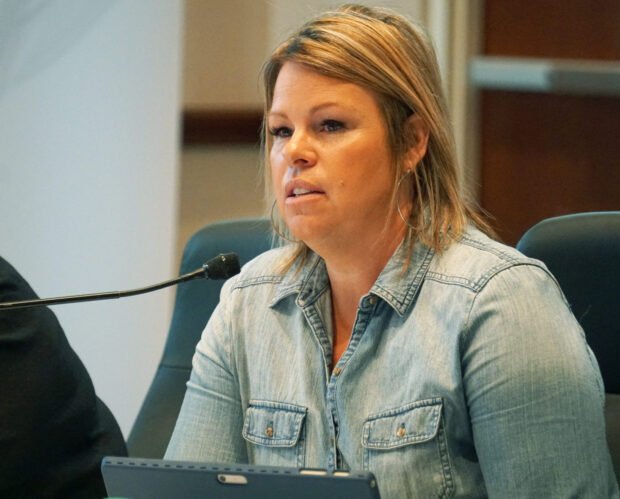The leaders of Idaho’s K-12 education task force are proposing a new school accountability system that is narrowly focused on early literacy and bound by local control.
Saying it was time to “reset the baseline,” Boise businessman Bill Gilbert spelled out a rough proposal during the group’s meeting Monday morning at Boise State University. Gilbert is the co-chairman of Gov. Brad Little’s education task force, “Our Kids, Idaho’s Future.”
The idea loosely calls for:
- Using early childhood literacy in grades K-3, as measured by the Idaho Reading Indicator (or IRI) test), as the hallmark of the accountability system.
- Using growth on the IRI as a singular data point to explain and present to the community for accountability purposes. Gilbert said the growth data needs to account for a school’s demographics, such as poverty and English language learners, and must be compared in context alongside other similar cohort groups.
- Training for all school board trustees on the IRI, data, growth and how to help community members make sense of what the data mean.
- School boards holding superintendents accountable for growth on IRI scores, as compared against an appropriate cohort group.
“Ultimately accountability for student performance lies in those communities where those students live,” Gilbert said. “Our local communities and local school boards are the ones driving and responsible for accountability for how schools perform.”
In order to succeed, Gilbert said the system must be simple and measurable. Bogging it down with other data points, compliance requirements and student achievement metrics could distract from the true main goal and make it harder to understand whether schools are meeting the mark.
Gilbert went on to say that transparency and data reporting alone are not true accountability. He also blasted efforts to hold classroom teachers accountable. He said leadership should bear the burden, starting at the school board level and then filtering down through superintendents and principals.

State Board of Education President Debbie Critchfield, who co-chairs the task force, backed Gilbert up. She said the accountability plan makes sense because Idaho is already focused on literacy and policy leaders have already agreed the IRI is a good way to measure literacy.
“You can rest assured your co-chairs have spent a lot of time talking about how to approach this,” Critchfield said.
It appears the literacy-focused local accountability system has support from the highest level of state government. Gilbert said he discussed the proposal with Little in detail.
Throughout his first year as governor, Little has made literacy a top priority. He pushed the Legislature to double the state’s investment in early literacy programs, directing an additional $13 million earlier this year.
And before the task force even got to work this summer, Little stressed that he wanted any recommendations to be centered around literacy or college and career readiness. Little also told task force members to keep their wish list short; he wanted a few quality recommendations instead of a laundry list.
Preliminary IRI data from this past spring showed that 30 percent of Idaho K-3 students did not meet grade-level benchmarks in literacy when the most recent school year ended. That means more than 25,000 students will be playing catch-up as the new school year begins across the state.
The accountability system is only a proposal at this point and has yet to be endorsed by the full task force. A few task force members expressed concerns.
“These are volunteers,” Kimberly Superintendent Luke Schroeder said, speaking about school board members. “I don’t know how to ask them to do any more than they are already doing.”
It also doesn’t appear the state could mandate training for school board members based on current Idaho law.
Karen Echeverria, executive director of the Idaho School Boards Association, said the Legislature provides $1.2 million a year for training for all school board members. Training is optional, and the ISBA only billed about $200,000 last year, she said.
“It’s the same boards that get trained over and over again and we have whole groups of boards that get no training,” Echeverria said. “It’s how do we get to those other boards?”
St. Maries School Board Vice Chairman Jody Hendrickx, ISBA’s vice president, agreed.
“Some boards get training and a lot of them don’t,” he said. “I don’t know how to force their hand.”
It wasn’t initially clear Monday whether or how results from the IRI, which is administered only in grades K-3, would provide accountability for Idaho’s junior high and high schools.
The full task force is scheduled to meet again Sept. 13 at Idaho State University in Pocatello. The task force’s teacher pipeline subcommittee meets Tuesday in Boise.
Check back with Idaho Education News on Tuesday afternoon for full coverage from the teacher pipeline subcommittee meeting.
